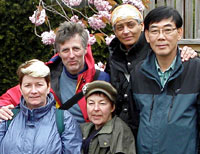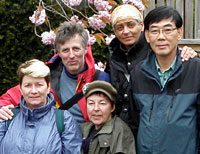The FIC Wants to Find Out
Laird Schaub
FIC Executive Secretary

Bjorn Grinde (top, left) visiting
at Findhorn Community, Scotland.
The FIC is teaming up with researchers to try to answer this question.
The FIC is teaming up with researchers Bjorn Grinde (chief scientist with the Norwegian Institute of Public Health), David Sloan Wilson (distinguished professor of biology and anthropology at SUNY Binghamton), and Ian MacDonald (PhD student at SUNY Binghamton) to try to answer this question by going straight to the source: asking people living in intentional communities what they think.
To accomplish this, we are inviting all adults living in intentional communities to participate in a study that can be completed online in about 25 minutes. With the idea that communities may have something important to teach the mainstream, the research will attempt to measure to what extent the quality of life has been enhanced by living in a community.
As scientists who study communities of all sorts—including businesses, volunteer organizations, congregations and urban neighborhoods—the researchers are especially interested in how the organization of social groups influences the psychological and physical wellbeing of members. Intentional communities, they feel, offer an ideal opportunity to study these important topics.
Our hope is that the results will benefit your community, the Intentional Communities Movement, and the general public. We all wish to learn how to improve quality of life.
Here’s how it will work:
- Interested communities should contact Ian MacDonald at imacdon1 at binghamton dot edu
- They will be provided with a link to an anonymous survey.
- The survey contains questions about life satisfaction, community organization, social relations, and general well being.
- As an incentive, every community member who participates will earn their community an entry into a lottery (1st prize is $3,000; 2nd is $2,000; 3rd is $1,000). Winning communities will be announced and contacted after the survey is finished.
This project is supported by a grant from the John Templeton Foundation. If you have questions about the project, please contact Ian MacDonald at the email address above.

















